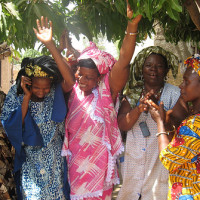Unfair Treatment of Women Persists in Cambodia
 Although small gains have been made, in general Cambodian woman still fall behind their male peers regarding education and positions within the labor market. According to a study conducted by the International Labor Organization (ILO), men make up only 5% more of the 7.4 million-person workforce, however on average they earn approximately $25.00 more per month.
Although small gains have been made, in general Cambodian woman still fall behind their male peers regarding education and positions within the labor market. According to a study conducted by the International Labor Organization (ILO), men make up only 5% more of the 7.4 million-person workforce, however on average they earn approximately $25.00 more per month.
Ros Sopheap, Executive Director of NGO Gender and Development for Cambodia, attributes this difference to inequalities regarding the calibre of education received by both men and woman. “There are some changes if you compare to 10 years before, but the changes have not come as far as we want,” said Sopheab.
For many traditional Cambodians, men are viewed as having an important role within the family to study in higher education, whereas women are encouraged to enter the workforce and financially contribute to the family instead of focusing on education.
The ILO’s Labor Force Report revealed that more than 1.14 million women had never attended school, which is more than double that of men surveyed. The majority of women surveyed provided answers that corroborated with Sopheab’s thoughts that they didn’t attend school since their parents would not allow it. Some others also stated they didn’t attend school due to their family’s inability to pay for school, or simply living too far a distance from a school.
Surprisingly, more woman than men finish primary school, yet they account for only 43% of Cambodia’s secondary school graduates. Of the percentage of woman completing secondary school, only 32% of them go on to complete university. As a result of women not completing schooling the whole way through, often they become vulnerable when entering the workforce are subject to unjust exploitation.
For instance, within the garment industry in Cambodia, women are consistently placed in unstable positions in the labor market. According to the ILO report, more than 80% of Cambodia’s garment workers are women who fall victim to poor working conditions and unfair compensation earning just $75 per month which is far below the amount stipulated by the Asia Floor Wage Alliance of $281 per month.
Women who never attended or dropped out of school are aware of the link between education and increased opportunities, so there has been an rise in literacy among the current working-age Cambodians. This past year, Cambodia has had a 2% increase in literate workers, mostly from rural women, so there is hope of a growing literate workforce of women in the future.
Creative Commons Love: Global Photo Archive on Flickr.com
Written by Ashleigh Brown









